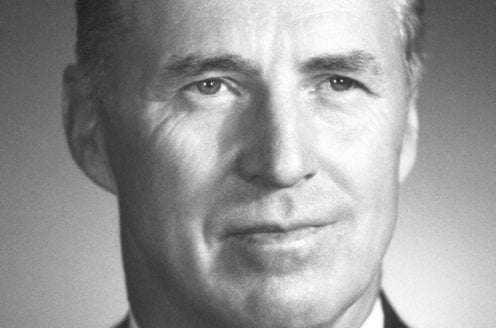- Change Makers
- Posts
- Monday: How to save the world?
Monday: How to save the world?
Eradicating starvation from the face of the planet

Morning Change Makers,
This week's story involves the end of the world, some 20th-century alchemy, and a new-age bio-tech company that is definitely a Change Maker.
That's right. You guessed it. This week is about food, and how we can make more if it.
Read on,
Jack
Feeding the world
I am imagining you reading this at the moment. Perhaps sitting down and reading Change Makers over your morning coffee and breakfast. Maybe you're chowing down some poached eggs, or Alpen, or Weetabix or because it’s a bank holiday you are treating yourself to some pancakes.
Have you ever thought about where your food comes from? That piece of toast, pancake, or Weetabix - have you ever thought about the science involved in getting it to your plate?
Humanity would not be where it is today without the engineering of crops and agriculture.
To explain why, cast your mind back to the 1960s.
Is the world ending?
When you think about the 1960s, you might think about the moon landings, the Vietnam War, JFKs assassination.
What I didn’t think about was a global food shortage.
In the late 1960s, Paul Ehrlich, an American biologist, released a book called “The Population Bomb?”. Its core thesis was that the global population was rising at a faster rate than global agricultural production could keep up with.

He predicted widespread famine and starvation would kill 100s of millions of people in the 70s and 80s. He went a step further and argued for aggressive population control measures like sterilization and essentially giving up on countries like Egypt and India, which he hilariously deemed hopeless.
I have not read Ehrlich’s book but it was clearly persuasive, with governments actually enforcing population control measures (often sadly paired with egregious human rights violations).
And on the surface, Ehrlich’s logic stands. The global population was growing exponentially while food production grew linearly. You don’t have to be Einstein to know that, if true, this would be problematic.
So did the world enter into global starvation in the 1970s/80s? No, it didn’t.
But why?
The green revolution
Darwinian evolution was a function to select the most useful and competitive genes in each generation of animal or plant.
Each parent would pass on 50% of its genetic material to the child. The offspring with the most favourable set of genes would out-compete the others and then pass on 50% of their genetic material.
Biologists knew that they could accelerate Darwinian evolution by selecting parents with the most favourable genes and breeding them. This is called selective breeding.
Enter stage right, Norman Borlaug; an American agronomist who led the world into an era of calorie abundance. Borlaug would take wheat plants with strong stems (less likely to wilt in hot weather) and mate them with disease-resistant wheat plants.
Some of the fertilised seeds would then be both disease-resistant and have stronger stems for hot weather. It was called the Semi-Dwarf, High-Yielding Wheat Varieties (catchy name I know).
Scientists then used advances in genetic research to clone the seeds and only plant the seeds with favourable traits. This ingenuity among other advances in fertiliser and irrigation prevented Ehrlich’s dystopian future.
Ehrlich is the kind of feeble academic who in the event of a zombie apocalypse would point at his neighbour and shout “Eat them! They taste better” rather than killing some fucking zombies.
Borlaug was rightly recognised for being the Iron Man of Herbology and won a Nobel Peace Prize for his work.
But why are we bringing this story back up today?
Ohalo
One of the many wonderful parts of plant genetics is that they can pass on multiple chromosomes. This is called Polyploidism.
This is when, by chance, parents pass on 100% of their genetics rather than 50%.
Humans only have two chromosomes. Wheat plants have 6 chromosomes so they are called Hexaploids. Potatoes are tetraploids (4 chromosomes).
You can think of plant genetics more like a toolbox. Plants will activate certain genes when they are needed so it is genetically advantageous to have more chromosomes.
Why does this matter?
A few years ago, a clever scientist called Jud Ward asked if it was possible to use protein engineering to guarantee that each parent plant passed on 100% of its genetic material.
It turns out it was, and has the potential to bring about Green Revolution: The Sequel.
Each year, $10bn is spent on genetically enhanced seeds using the Borlaug method. This results in about a 1-2% increase in yield (Yield means the total amount of crop produced per acre).
In early studies, Ohalo can increase the yield of a potato plant by 50-100%.
That is 20x more than current methods.
An Ohalo future
Food matters not just because it is a human right, but because malnourishment is unproductive.
The future is not realised sooner because there are a lot of people still suffering. Whether that be disease, poverty, or starvation, relieving these problems allows more people to become productive members of society.
Ohalo have the ability to increase crop yields in places where it's needed. The US produces more than enough calories per person but 20% of the African population are malnourished. That is 250 million people.
Apparently, Elrich is still worried about overpopulation but I am not. Human ingenuity has proven time and again that we can feed the planet. Ohalo is the company proving him wrong, again.

